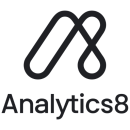Are robots coming for us?
The short answer is no — but generative AI is piquing the interest of tech companies across the globe, spurred by the rise in popularity of apps like ChatGPT and Lensa.
It’s already vital to many employees’ daily workflow. But while this technology comes with many pros, there are still questions surrounding its safety and accuracy, urging some tech leaders to reconsider its application in certain fields.
One thing is certain: AI is here to stay.
Recently, Built In Chicago caught up with tech leaders from Analytics8, Hireology, Grand Studio and Bounteous to hear their perspectives on what the future holds for this emerging field.
Analytics8 is a data and analytics consultancy.
How are you implementing GenAI at your company?
We have a variety of internal use cases, ranging from chatbots that help employees understand HR policies and our customer delivery model to mechanisms that streamline contract review and compliance functions.
We invest in GenAI to improve efficiencies throughout the organization, but by taking on these initiatives ourselves, we have gained more practical knowledge of AI projects. We have first-hand experience with use case development and rollout challenges in a real-world environment that we can leverage in AI engagements with our customers.
Are there any concerns you have about GenAI? What are they, and how are you safeguarding your business against them?
My concerns lie in three areas.
First, employees can leak sensitive information when using public GenAI tools. Educating employees about how these tools work is essential and providing employees access to private internal GenAI tools is key to maintaining governance while empowering people to leverage GenAI to be more productive.
Another concern is the underutilization of GenAI. Many companies view GenAI as a fact-finding chatbot, but there are more beneficial uses. Companies should collaborate with thought leaders on use case development to make sure they’re not missing opportunities.
Many companies view GenAI as a fact-finding chatbot, but there are more beneficial uses.”
Finally, organizations risk overutilizing GenAI by making it the process rather than part of it. We’re not yet at a point where we can trust these tools without human scrutiny, so we should set our expectations and plan accordingly.
How do you think GenAI will shape your industry? How might this transformation affect your company?
Data visualization will become less relevant as people increasingly consume and interact with data via natural language, blurring the lines between operational and analytical systems even further. The definition of data literacy will broaden to include GenAI use cases and challenges. Data governance will be more relevant than ever, but the tension between pragmatists and idealists will be at a fever pitch as organizations balance governance policies versus rapid adoption and real-world practicalities.
These changes will disrupt many companies, making them less efficient before making them better. However, it won’t be jarring for Analytics8. For us, this is just another transformative shift in the data and analytics industry. We will continue to help companies develop and implement an AI strategy and navigate organizational and cultural changes as these initiatives take shape.
Hireology is one of the fastest-growing hiring and talent management platforms in the United States.
How are you implementing GenAI at your company?
Hireology is an all-in-one platform for recruiting, hiring and employee management, specializing in assisting multi-location decentralized businesses in building their best teams. Our interest in AI stems from its vast potential to enhance intelligence around our customers' hiring needs, thereby reducing the time to hire. The release of OpenAI's GPT-3 and GPT-4 models marked a turning point, demonstrating that GenAI is here to stay. This, along with significant investments from major tech companies like Microsoft, reinforces our belief in its potential.
In 2023, following a highly successful private beta, Hireology introduced Beaker, our first AI assistant. Currently, Beaker focuses on aiding users in creating detailed job descriptions through our platform's user-friendly workflow. GenAI is a key part of our core strategy for 2024, and we have several exciting, yet-to-be-announced features in the pipeline.
Are there any concerns you have about GenAI? What are they, and how are you safeguarding your business against them?
GenAI holds immense potential but requires careful consideration. At Hireology, we adhere to key principles for responsible AI deployment like accountability, reliability and security, to name a few.
AI models like GPT-4, trained on internet content and user inputs, can inadvertently expose sensitive data. To mitigate this, Hireology employs private, read-only AI model copies for content creation, ensuring data integrity.
We're also aware of GenAI's challenges, such as inherent biases and prompt injections. Our commitment to responsible AI principles helps prevent these issues from leading to inappropriate outcomes. We use a cross-functional team to scrutinize prompts, ensuring they are ethical and minimally data-reliant. Systematic testing and red-teaming are conducted to counter adversarial attacks.
Our alignment with RAI principles underscores our dedication to controlling our AI offerings and maintaining trust as this technology rapidly evolves.
How do you think GenAI will shape your industry? How might this transformation affect your company?
Predictions about technology of this significance are educated guesses. GenAI is set to significantly influence all industries. Companies are likely to embrace this technology to achieve substantial productivity and quality gains, as well as to gain first-mover advantages. Consequently, they will require individuals with expertise in this area. With every technological leap, we observe the emergence of new job opportunities — even as some existing jobs become obsolete.
With every technological leap, we observe the emergence of new job opportunities — even as some existing jobs become obsolete.”
Hireology is well-positioned to adapt to the AI shift, as we see considerable potential to provide value to our customer base through this technology. As AI transforms various industries, hiring managers will need to reassess the types of roles required and how to leverage AI effectively. For this, a strong, trusted platform like Hireology will be essential.
Grand Studio is a strategic design firm — home to talented thinkers and makers who collaborate around digital and operational design.
How are you implementing GenAI at your company?
At Grand Studio, we constantly test emerging technologies to help our clients more concretely understand their benefits and pitfalls. Our initial implementation attempts of ChatGPT were with secondary research, marketing planning and open answer synthesis in spreadsheets. Unfortunately, the research implementations weren’t very successful given the frequent hallucinations currently experienced within a lot of text-based GenAI, and the marketing implementation provided nothing as strategically insightful as a human could.
That said, where we’ve found some success is utilizing both ChatGPT and Miro AI as a brainstorming tool during conception, similar to what you might experience with the exercise of forced associations. These tools enable very fast starter ideas in seconds so we can get to deeper, more innovative ideas quicker.
Are there any concerns you have about GenAI? What are they, and how are you safeguarding your business against them?
Hallucinations are a giant concern when it comes to GenAI. If you can’t trust the result, then the tool is not worth utilizing. For that reason, we double-check any “facts” GenAI presents, using the tool more so for ideation than evidence.
We spend time with clients in the upfront discovery process to understand the problem they’re trying to solve. This means understanding if the problem needs AI — and if it does, what that means for the people who will be using it. We take a human-centered approach to AI, which helps safeguard against privacy and the trust issues that come with the tool in its current state.
We take a human-centered approach to AI, which helps safeguard against privacy issues.”
How do you think GenAI will shape your industry? How might this transformation affect your company?
From a design perspective, I think a lot of people are concerned that GenAI is going to replace designers. While there is a lot that GenAI can do, what it lacks is human nuance. Contextual nuances are hard for a machine to read so, for now, we still need humans to better understand the “why.”
What we do see is AI becoming a tool to help humans do their work more efficiently. They’ll be able to knock out photoshopping an image more quickly and do data analysis in less time, giving the designers more time to consider which image will resonate with customers, how to improve it, and what the synthesized data means for a specific user base. This is more value-dense work, and saving humans the time to apply their brains in a “top of license” way will make the work more interesting.
Bounteous co‑innovates with the world’s most ambitious brands to create transformative digital experiences.
How are you implementing GenAI at your company?
We believe GenAI will usher in a new way of value creation for us as a company and in the tools and solutions delivered to our clients. Thus, we are following the same advice that we’re giving our clients and taking a measured approach. We look at GenAI through two lenses. What can we use to improve our productivity and make us smarter, and how can we provide business value?
Looking at where we can increase our productivity, we have implemented GenAI solutions to enable us to do repeatable tasks more efficiently. We use GenAI tools in our sales, marketing and HR functions through custom tools that we’ve built, and we’re enabling our team members to learn about these solutions that are part of the technologies we implement. Being able to advise and guide our clients is the value they expect from partnering with us.
We decided to invest in GenAI technology because we knew it would be more than a fad. GenAI is fundamentally changing how businesses work, and we are excited to be at the forefront of this technology wave.
Are there any concerns you have about GenAI? What are they, and how are you safeguarding your business against them?
Naturally, we have the same concerns as most companies. Specifically, we care about keeping our data and our customers’ data safe. For our teams to get value, we care about the accuracy of the answers and content provided. While GenAI technology has been in the making for decades, it is still very new to the general public, and that comes with a lot of risks.
Bounteous Mitigates Risks in 3 Ways:
- Creating its own tool for employees, which does not train the larger models it connects to. This allows them to experiment and learn about GenAI in a safe place without the risk of exposing company or client data.
- Establishing a multi-discipline council to enforce company policies around the use of GenAI, prioritizing how the company educates its employees on the tool.
- Creating internal communities for its employees to learn more, ask questions and get information regarding the positive and negative uses of GenAI.
How do you think GenAI will shape your industry? How might this transformation affect your company?
As a digital consulting agency, we deal with technology for a living. Now more than ever, GenAI is baked into the tools both our company and our clients use. This requires us to adapt and adopt solutions sooner so we can advise our clients appropriately.
While AI and GenAI are all the buzz right now, it is deep in the hype cycle. Over the next few years, AI and GenAI will become ubiquitous in our daily work. Even in the last year, the level of trust around what content can be used publicly, such as marketing copy, has increased. The models will get better with each iteration, and their value will continue to increase as new use cases emerge or existing ones become more reliable. Employees will need to adapt to having these tools at their disposal to increase their productivity, and companies will need to adapt to having AI working on their behalf.













